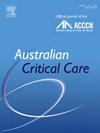儿科重症监护室 48 小时意外再入院的发生率和相关风险因素:综合回顾。
IF 2.7
3区 医学
Q2 CRITICAL CARE MEDICINE
引用次数: 0
摘要
背景:非计划性儿科重症监护病房(PICU)再入院与发病率/死亡率、住院时间和医疗服务成本的增加有关,被认为是衡量医疗服务质量的关键绩效指标。然而,有关计划外 PICU 再入院风险因素的研究证据非常有限,而且不同研究的结果也不一致。目的:本实验旨在整理和归纳计划外 48 小时内 PICU 再入院的发生率和相关风险因素:方法:在五阶段框架的指导下进行了综合回顾。检索了七个电子数据库(2013 年至 2023 年 6 月 30 日)。纳入的研究均以英文发表,可查阅全文,并提供了详细的研究方法。采用乔安娜-布里格斯研究所(Joanna Briggs Institute)的检查表对纳入研究的质量进行了严格评估。对患病率和风险因素进行提取、综合,并以叙述的方式呈现:10项研究符合资格标准,报告的再入院率从0.008%到6.49%不等。提取了 15 种重要的风险因素。其中有 12 项风险因素被一致引用,包括年龄、体重、复杂的慢性病、入院来源、非计划入院、PICU 住院时间、正压通气、出院处置、氧需求、呼吸频率、心率和出院时的格拉斯哥昏迷评分。在这 12 项预测因素中,有 5 项被归类为可改变的因素,包括出院处置、氧气需求、呼吸频率异常、心率异常和出院时格拉斯哥昏迷评分降低:本研究承认,影响 PICU 意外再入院的混杂因素十分复杂,而且对潜在风险因素的研究缺乏标准化。五个可改变的因素都提示了临床不稳定性和 PICU 提前出院。有可改变风险因素的患者应重新评估其出院准备情况。管理再入院风险患者的支架支持包括高级床旁护理分配、PICU 外展服务的使用以及病房环境中 1:2 的护士与患者比例,这些都是确保患者安全的必要条件。本文章由计算机程序翻译,如有差异,请以英文原文为准。
Prevalence and risk factors associated within 48-hour unplanned paediatric intensive care unit readmissions: An integrative review
Background
Unplanned paediatric intensive care unit (PICU) readmission is associated with increased morbidity/mortality, hospital length of stay, and health service cost and is recognised as a key performance indicator of quality-of-care delivery. However, research evidence on unplanned PICU readmission risk factors is limited, and results were inconsistent across studies.
Aim
The aim of this experiment was to collate and synthesise unplanned within-48-h PICU readmission prevalence and associated risk factors.
Methods
An integrative review was conducted, guided by a five-stage framework. Seven electronic databases were searched (2013–30th June 2023). Studies published in English with full-text accessibility and detailed methodologies were included. The quality of included studies was critically appraised using the Joanna Briggs Institute checklists. Prevalence and risk factors were extracted, synthesised, and presented narratively.
Results
Ten studies met eligibility criteria and reported a varied readmission rate from 0.008% to 6.49%. Fifteen types of significant risk factors were extracted. Twelve consistently cited risk factors were age, weight, complex chronic conditions, admission source, unplanned admission, PICU length of stay, positive pressure ventilation, discharge disposition, oxygen requirements, respiratory rate, heart rate, and Glasgow Coma Score at discharge. Of the 12, five predictors were classified as modifiable factors, including discharge disposition, oxygen requirement, abnormal respiratory rate, abnormal heart rate, and decreased Glasgow Coma Score at discharge.
Conclusion
This review acknowledges the complexity of confounding factors impacting unplanned PICU readmission and the lack of standardisation examining potential risk factors. The five modifiable factors are suggestive of clinical instability and premature PICU discharge. Patients with modifiable risk factors should have their readiness for discharge re-evaluated. Scaffolding support to manage patients at risk of readmission includes senior bedside nursing allocation, use of PICU outreach services, and 1:2 nurse-to-patient ratios in the ward setting, which are warranted to ensure patient safety.
求助全文
通过发布文献求助,成功后即可免费获取论文全文。
去求助
来源期刊

Australian Critical Care
NURSING-NURSING
CiteScore
4.90
自引率
9.10%
发文量
148
审稿时长
>12 weeks
期刊介绍:
Australian Critical Care is the official journal of the Australian College of Critical Care Nurses (ACCCN). It is a bi-monthly peer-reviewed journal, providing clinically relevant research, reviews and articles of interest to the critical care community. Australian Critical Care publishes peer-reviewed scholarly papers that report research findings, research-based reviews, discussion papers and commentaries which are of interest to an international readership of critical care practitioners, educators, administrators and researchers. Interprofessional articles are welcomed.
 求助内容:
求助内容: 应助结果提醒方式:
应助结果提醒方式:


